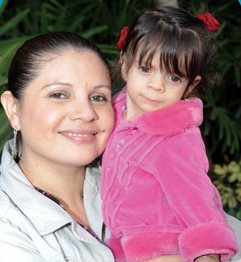It’s fitting that baby Analiah Duarte Escorcia was born in February, Heart Month. Thanks to groundbreaking cardiovascular surgery performed at Nicklaus Children's Hospital, formerly Miami Children's Hospital, soon after her birth in 2012, she is now the poster child for a novel new procedure that seems poised to become the “holy grail” for children with heart valve defects. Little Analiah came into the world with one of the most devastating of heart defects, called Ebstein's Anomaly. “She had two defective heart valves and had very limited options,” recalled her surgeon, Dr. Redmond P. Burke, Director of Cardiovascular Surgery at Nicklaus Children's. “Her heart was massively enlarged and had compressed both of her lungs severely. The mortality rate for this defect is among the highest for any congenital heart problem.” Prevailing treatment options are limited for patients with these challenges. One current approach is to close the valve completely with a patch and turn the child’s heart into a rudimentary single ventricle, requiring multiple subsequent operations. However, no available mechanical or biological valve would safely fit within the child’s heart. Ever the innovator, Dr. Burke used extracellular matrix (ECM) material, developed from porcine intestines by biotechnology leader CorMatrix Cardiovascular, to craft the new valve in the operating room. The valve was then implanted, with sutures anchoring it to the support structures in the child’s right ventricle.
Now at home with her family, Analiah has had a remarkable recovery. A year later, the valve continues to function well and the child is on minimal medication. The true test will be the continued growth of the valve over time.
 Dr. Burke noted that the ECM shows great promise for babies requiring valve repairs and replacements as the material stimulates the patient’s natural wound-healing mechanisms, allowing the patient to regrow healthy tissue, effectively becoming an integrated part of the patient’s body.
Dr. Burke noted that the ECM shows great promise for babies requiring valve repairs and replacements as the material stimulates the patient’s natural wound-healing mechanisms, allowing the patient to regrow healthy tissue, effectively becoming an integrated part of the patient’s body.
“This is the holy grail of heart valve reconstruction,” he said. “Our hope is that this revolutionary extracellular matrix technology will allow stem cells to be attached to the valve and become normal valve tissue, capable of growth, so that the child’s tricuspid valve will not have to be replaced in the future.” Children receiving transplants with current biological or mechanical valves typically must undergo reoperations for valve replacement procedures every 10 years or so, or as the valve wears out or the child outgrows it. “We are hopeful that this technology will prove to be a new standard of care in congenital heart surgery, allowing us to create heart valves that will grow with our smallest newborn into functioning adult valves,” said Dr. Burke.